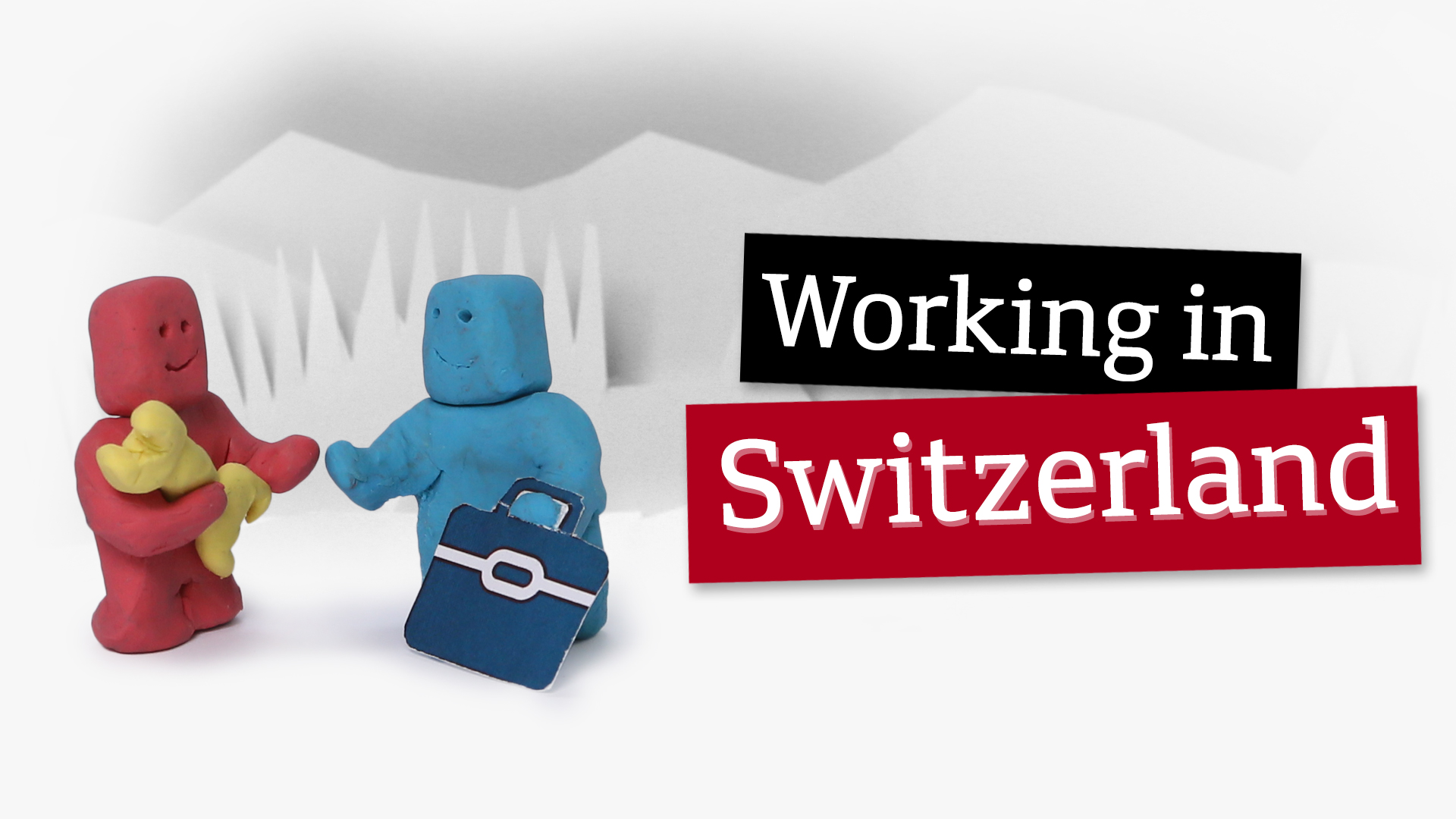Employment contracts

Legally, employees in most sectors and occupations in Switzerland cannot work more than 45 hours a week, and everyone is entitled to four weeks’ paid holiday a year. Many contracts nonetheless offer better terms of employment.
There is no set legal formula for work contracts, but they are normally written agreements. Three types of contract exist in Switzerland:
– individual employment contract: this is a document signed by the employer and employee, which sets out the rights and obligations of both parties. It must include the date of the start of employment and the employee’s function, salary and weekly working hours.
Fixed-term contracts must also clearly state the date when the employment ends.

More
What is it like to work in Switzerland?
– collective employment agreement: this is an agreement signed between employees, trade unions and one or more employers (or their employers’ association) that lays down the minimum working conditions in a specific job sector. It thus defines wage levels, holidays, working hours and notice periods, which are then applicable to the individual work contracts. There are many legally binding collective agreements covering a wide range of sectors in Switzerland, including construction, hairdressing, and private security. Other agreements are only relevant to a particular region or company.
– standard employment contract: in sectors where there is no collective employment agreement, the federal or cantonal authorities may institute a standard employment contract that defines the working conditions, especially the minimum compulsory wage. When drawing up individual work contracts, the employer may only modify these conditions to offer better terms for the employees. Standard employment contracts are often put in place to end repeated violations of the usual wage conditions in a region, occupation or sector. An example at the national level is the standard employment contract for domestic staff.
Working hours
The employment contract lays down the number of working hours per week. The maximum legal working time amounts to 45 hours a week for employees in industrial enterprises, office staff, technical personnel and other employees including sales assistants in large retail businesses. For all other salaried persons, the upper limit is 50 hours.

More
How hardworking are the Swiss?
In Switzerland, managerial staff often have no fixed working hours. Many employers consider that the longer time worked is compensated by the higher salary.
If an employee works more than the number of hours stipulated in his/her contract, this is contractual overtime. Whether the extra hours are paid or recovered as time off depends on what has been agreed with the employer or the conditions set out in the contract or collective employment agreement.
If an employee works more than the maximum number of weekly hours stipulated by the law, this is statutory overtime. It must be paid at 125% or, with the consent of the employee, compensated with the same amount of free time. Statutory overtime may not exceed two hours per day or 170 hours per year (for a 45-hour working week) or 140 hours per year (for a 50-hour working week).
In Switzerland, employers must apply for special permission to employ staff to work at night or on Sundays. Those concerned are entitled to wage supplements and time off in compensation as laid down by the law.
Leave and holidays
The right to holidays and time off is also enshrined in the law. All workers are entitled to a minimum of four weeks off per year regardless of their employment rate. Young people under the age of 20 are entitled to five weeks off. Work contracts and collective employee agreements often offer a more generous holiday allowance, especially for staff over the age of 50.

More
Swiss enjoy more and more paid annual leave
Employees may also take leave in the following situations:
– public holidays: the only country-wide public holiday is August 1, Swiss national day, but all cantons have their own public holidays.
– special events: these are not laid down by the law but are usually specified in the collective employment agreement or company regulations. They may include attending funerals, getting married, moving house and doctor’s visits.
– voluntary youth work: employees under the age of 30 are entitled to five days of unpaid leave per year for the purpose of carrying out unpaid leadership, care or advisory activities in connection with extracurricular youth work, or for related training.
– caring for a relative: workers may take paid leave to look after a sick family member or partner.
– sickness: an employee who is sick is granted leave by the employer and continues to receive his/her salary for a set period of time. This may vary depending on the employer’s insurance and the geographic region. In general, sick staff receive 80% of their income for a maximum of 24 months.
– birth: parents are entitled to take leave after the birth of their child. Maternity leave lasts 14 weeks and paternity leave lasts two weeks.

More
Digitalisation and surveillance at work: is your boss spying on you?
Terminating an employment contract
An unlimited employment contract may be terminated by either of the two parties, provided the period of notice and the date for giving notice are respected (see next point). Should the other party request this, the party giving notice must give written grounds for his/her decision. Furthermore, the employer and employee may at any time agree to terminate their employment relationship by mutual consent.
During the trial period either party may terminate the employment contract at any time by giving a seven-day notice. After the trial period, a contract may be terminated at the end of any month by giving a one-month period of notice in the first year of employment, two months in the second to the ninth year of employment and thereafter three months. Each employer may change these periods of notice, so read contracts carefully.
The employer cannot dismiss a woman who is pregnant or gave birth in the previous 16 weeks. Sick and injured employees are similarly protected against dismissal. This means that during a set time frame (between one and six months), depending on how long the employee has been with the company, the employer may not terminate the employment contract.
For more information on employment contracts and leave, see:
– the official website https://www.ch.ch/en/work/External link
– Frequently askedExternal link questions on labour law compiled by the Swiss State Secretariat for Economic Affairs (SECO). Available in French, German and Italian.
– Employee protection informationExternal link (SECO)
– Contractual aspects pertinent to small and medium-sized enterprises (SMEs)External link
– Overview of collective labour agreementsExternal link. Available in French, German and Italian.
– Overview of standard employment contractsExternal link. Available in French, German and Italian.

In compliance with the JTI standards
More: SWI swissinfo.ch certified by the Journalism Trust Initiative









You can find an overview of ongoing debates with our journalists here. Please join us!
If you want to start a conversation about a topic raised in this article or want to report factual errors, email us at english@swissinfo.ch.